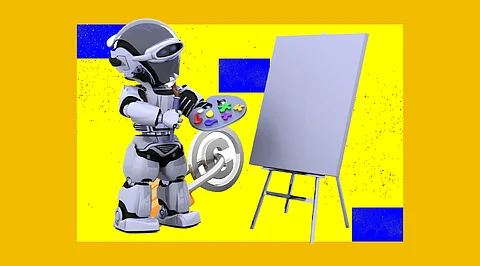

Artificial intelligence programs like DALL-E, Midjourney, and Stable Diffusion may quickly generate an image for you if you type in a request like "a bar of chocolate mounted on a bicycle in the spirit of Picasso." They do this by combining components from the enormous digital collections of photos and artwork that are accessible from all over the internet and on which they have received training. Are the A.I. tools violating the creators' copyrights in the process, though? Two new lawsuits center on that issue.
Three artists have filed a lawsuit against Stability AI, Midjourney, the companies behind the artificial intelligence art generators Stable Diffusion and Midjourney, and DeviantArt, which recently unveiled its own AI art generator called DreamUp. By using five billion photos that were scraped from the internet "without the consent of the original artists," the artists Sarah Andersen, Kelly McKernan, and Karla Ortiz claim that these organizations have violated the rights of "millions of artists."
Attorney and typographer Matthew Butterick and the Joseph Saveri Law Firm, which focuses on infringement and class action cases, filed the claim. Butterick refers to the lawsuit as "another step toward making AI fair & ethical for everyone" in a blog post announcing it. The ability of AI art tools like Stable Diffusion to "flood the market with an essentially unlimited number of infringing images will inflict permanent damage on the market for art and artists," according to him, will cause this damage. In a related case concerning the AI programming model CoPilot, which is educated using lines of code gathered from the internet, Butterick and Saveri are planning to sue Microsoft, GitHub, and OpenAI.
The art world has reacted aggressively to the surge in the popularity of AI art tools during the past year. While some claim that these tools, like earlier generations of software like Photoshop and Illustrator, might be useful, many more are against the exploitation of their work to train these lucrative algorithms. Millions of photos from the web are used to train generative AI art models, typically without the creators' knowledge or consent. Then, you may employ AI art generators to produce artwork that imitates a certain artist's style.
The knotty issue of whether or not these technologies violate copyright law will need to be resolved in court, according to experts. The makers of AI art tools typically claim that the fair use doctrine covers (at least in the US) the training of their software on copyrighted data. But there are various complexities when it comes to AI art generators, and issues involving fair use still need to be addressed. These include the locations of the organizations that built these tools (since the legal frameworks for data scraping in the EU and the US differ considerably from one another) and the objectives of these institutions (Stable Diffusion, for example, is trained on the LAION dataset, which is created by a German-based research non-profit, and non-profits may be treated more favorably than regular companies in fair use cases).
Technical errors have been found in the case filed by Butterick as well as the Joseph Saveri Law Firm, which has drawn criticism. For instance, the lawsuit asserts that AI art models act as "21st-century collage tool[s]" by "storing compressed copies of [copyright-protected] training images" and then "recombining" them. AI art models, on the other hand, contain graphical models of patterns gleaned from these photos rather than any actual images. The software instead generates new images relying on these mathematical operations rather than assembling fragments of existing images into a collage.
Join our WhatsApp Channel to get the latest news, exclusives and videos on WhatsApp
_____________
Disclaimer: Analytics Insight does not provide financial advice or guidance. Also note that the cryptocurrencies mentioned/listed on the website could potentially be scams, i.e. designed to induce you to invest financial resources that may be lost forever and not be recoverable once investments are made. You are responsible for conducting your own research (DYOR) before making any investments. Read more here.
